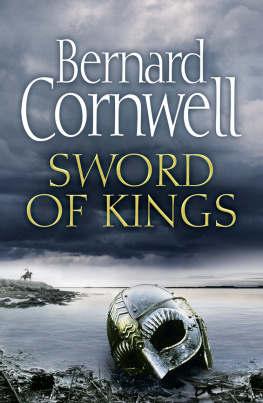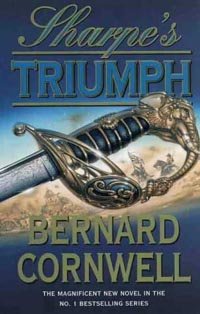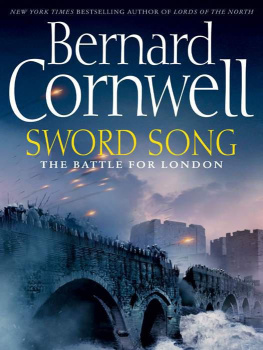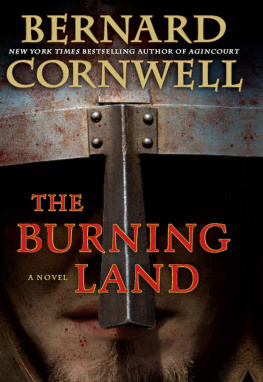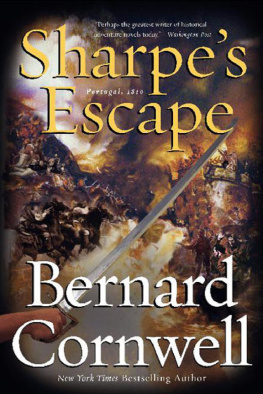Sharpe's Company
by Bernard Cornwell
HarperCollins (April 11, 1983)
ISBN-10: 0006165737
ISBN-13: 978-0006165737
for the Harper family,
Charlie and Marie, Patrick, Donna and Terry,
with affection and gratitude
'Now thou art come unto a feast of death. '
William Shakespeare
Henry VI, Part I, Act 4, Scene 5.
CHAPTER 1
January 1812
A pale horse seen a mile away at sunrise means the night is over. Sentries can relax, battalions stand down, because the moment for a surprise dawn attack has passed.
But not on this day. A grey horse would hardly have been visible at a hundred paces, let alone a mile, and the dawn was shredded with dirty cannon smoke that melded with the snow-clouds. Only one living thing moved in the grey space between the British and French lines; a small, dark bird that hopped busily in the snow. Captain Richard Sharpe, huddled in his greatcoat, watched the bird and willed it to fly away. Move, you bastard! Fly! He hated the superstition in himself. He had spotted the tiny bird and, quite suddenly and unbidden, the thought had come to him that unless the bird took wing within thirty seconds, then the day would end in disaster.
He counted. Nineteen, twenty, and still the damned bird hopped in the snow. He could not tell what kind of bird it was. Sergeant Harper would know, of course, the huge Irish sergeant knew all the birds, but knowing what kind of bird it was would not help. Move! Twenty-four, twenty-five, and in desperation he bundled a crude snowball and skittered it down the slope so that the small bird, startled, sprang up into the skeins of smoke with a couple of seconds to spare. A man must sometimes make his own luck.
God! But it was cold! It was all right for the French. They were behind the vast defences of Ciudad Rodrigo, sheltered in the town's houses and warmed by wide hearths, but the British and Portuguese troops were in the open. They slept by vast fires that died in the night and yesterday, at dawn, four Portuguese sentries had been, discovered frozen, their greatcoats iced to the ground, dead by the river. Someone had tipped them in, breaking the Agueda's thin ice, because no one wanted to dig graves. The army had taken its fill of digging; for twelve days they had done nothing else; batteries, parallels, saps and trenches, and they never wanted to dig again. They wanted to fight. They wanted to carry their long bayonets up the glacis of Ciudad Rodrigo, to go into the breach, to kill the French, and take those fires and houses for themselves. They wanted to be warm.
Sharpe, Captain of the South Essex's Light Company, lay in the snow and stared through his telescope at the largest breach. He could not see much. Even from the hillside, five hundred yards from the town, the snow-covered slope of the glacis hid all but the top few feet of Ciudad Rodrigo's main wall. He could see that the British guns had done damage and knew that the stones and rubble must have cascaded into the hidden ditch to make a crude ramp, perhaps a hundred feet wide, up which the attackers must climb to get into the heart of the fortress town. He wished he could see beyond the breach to the alleyways at the foot of the shot-scarred church tower that was so close to the walls. The French would be busy there, building new defences, siting fresh cannon, so that when the attack burst over the rubbled mound of the breach it would be met with precisely planned horror, flame and grapeshot, death in the night.
Sharpe was afraid.
It was a strange knowledge, known to him alone, and he was ashamed of it. It was not certain that the attack would be on this day, but the army, with the instinct of men who know that the time has come, were confident that Wellington would order the assault this night. No one knew which battalions would be chosen, but whichever units were to brave the assault they would not be the first attackers to climb the breach. That was a job only for volunteers, the 'Forlorn Hope', whose suicidal task was to draw the defenders' fire, force them to spring their carefully prepared traps, and clear a bloody path for the battalions that followed. Not many of the Forlorn Hope would live. The Lieutenant Who commanded, if he was still alive, would receive his Captaincy on the spot and his two Sergeants would be made Ensigns. The promises of promotion were easily given because they rarely had to be kept, yet there was never a shortage of volunteers.
The Forlorn Hope was for the brave. It may have been a courage born of desperation, or foolhardiness, but it was courage just the same. Men who survived a Hope were marked for life, famous among their comrades, envied by lesser men. Only the Rifle Regiments gave a badge to the survivors, a laurel-wreath that was sewn to the sleeve, but Sharpe did not hanker after medals. He simply wanted to survive a test, the supreme test of almost certain death because he had never been in a Forlorn Hope. It was a foolish desire, and he knew it, but it was there.
It was not just a test. Richard Sharpe wanted the promotion. He had joined the army at sixteen, as a Private, and worked his way through the ranks until he was a Sergeant. On the battlefield of Assaye he had saved the life of Sir Arthur Wellesley and had been rewarded with the telescope and a commission. Ensign Sharpe risen from the gutter, but still ambitious, still needed to prove, day after day, that he was a better soldier than the privileged sons who purchased their promotions and climbed the officers' ladder with monied ease. Ensign Sharpe became Lieutenant Sharpe and, wearing a new uniform, the dark green of the 95th Rifles, he fought his way through Northern Spain and Portugal; the Corunna retreat, Rolica, Vimiero, the Douro crossing, and Talavera. He had taken the French Eagle at Talavera when he and Sergeant Harper had hacked their way into an enemy battalion, cut down the standard bearer, and brought the trophy back to Wellesley. He became the Viscount Wellington of Talavera. And Sharpe had been gazetted, just before the battle, as a Captain. It was the promotion he most wanted; the chance to lead his own Company, but the gazette was now two and a half years old and it was still unapproved.
He could hardly believe it. In July he had gone back to England and spent the last six months of 1811 recruiting in London and the Shires for the shrinking South Essex Regiment. He had been feted in London, dined by the Patriotic Fund, and presented with a fifty guinea sword for the capture of the French Eagle. The Morning Chronicle had dubbed him 'the scarred Hero of the Field of Talavera' and suddenly, for a few days at least, everyone had wanted to meet the tall, dark-haired Rifleman with the scar that gave his face an unnatural, mocking expression. He had felt out of place in the draped softness of London's drawing rooms and had covered his discomfort by shrinking into silent watchfulness. The reticence had been thought dangerously attractive by his hostesses who had kept their daughters upstairs and the Rifle Captain to themselves.
But the Hero of the Field of Talavera was nothing but a nuisance to the Army Headquarters in the Horse Guards. It had been a mistake, a stupid mistake, but he had visited Whitehall and been shown to a bare waiting room. The autumn rain had spattered through a high, broken window as he sat, his huge sword across his knees, while a clerk with smallpox scars tried to find what had happened to the gazette. Sharpe simply wanted to know whether he was a real Captain, sanctioned as such by the Horse Guards' approval, or merely a Lieutenant in borrowed and temporary rank. The clerk had kept him waiting three hours, but at last returned to the room. 'Sharpe? With an e?'


